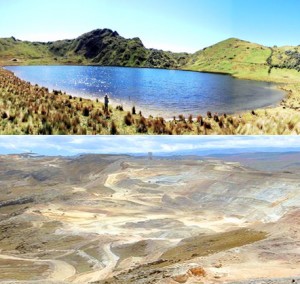
An agreement has not yet been reached between national and local authorities in Peru since I reported on the mining disputes there last December. While Newmont Mining Corporation stands by previous agreements with the government regarding the extraction of 11.6 million ounces of gold in Conga, the popular efforts against this and other mining mega-projects also stand resilient. The last meeting took place after a 10-day march that ended in Lima on February 10. This time, instead of solely objecting to the mining project, the protesters broadened their message to also ending the threat against their access to water.
According with Hugo Cableses, a former vice minister of strategic development in Peru, the mining projects in Conga will guarantee the disappearance of four lagoons that feed three rivers running to the Pacific coast and supplying around 210 villages—home to as many as 42,000 people—as well as the Amazon River Basin. While the environmental damage is already becoming evident, Newmont has offered to build four artificial pools that would replace the natural water sources, as they did in Yanacocha, where they replaced a natural lagoon with four tubes that provide people with two hours of dirty water a day.
The popular movement has still not succeeded, then, in making public needs and demands felt in the political sphere. Even after ensuring the resignation of 11 ministers and the presence of an international expert witnessing the project, the project will go on. The movement must demonstrate that the Peruvian economy doesn’t need to rely on exploitative mining. It must also show that, without water, whole regions and populations will lose their agricultural potential and food security, both within Peru’s borders and beyond them.
